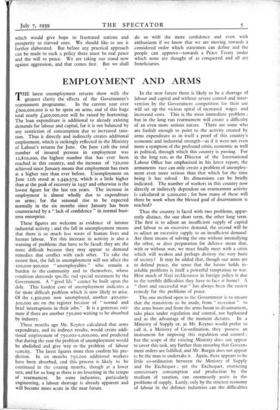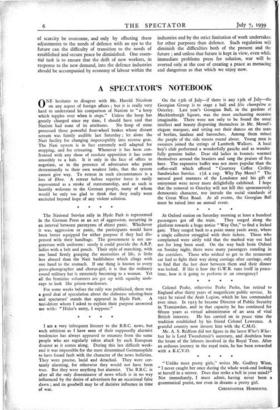EMPLOYMENT AND ARMS
THE latest unemployment returns show with the greatest clarity the effects of the Government's rearmament programme. In the current year over £600,000,000 is to be spent on arms, and of this huge total nearly £400,000,000 will be raised by borrowing. The loan expenditure is additional to already existing demands for labour and capital, for it is not balanced by any restriction of consumption due to increased taxa- tion. Thus it directly and indirectly creates additional employment, which is strikingly reflected in the Ministry of Labour's returns for June. On June 12th the total number of insured persons in employment was 12,810,000, the highest number that has ever been reached in this country, and the increase of 750,000 achieved since January means that employment has risen at a higher rate than ever before. Unemployment on June 12th stood at 1,349,579, which is a little higher than at the peak of recovery in 1937 and otherwise is the lowest figure for the last ten years. The increase in employment is almost wholly due to expenditure on arms; for the seasonal rise to be expected normally in the six months since January has been counteracted by a " lack of confidence " in normal busi- ness enterprise.
These figures are welcome as evidence of intense industrial activity ; and the fall in unemployment means that there is so much less waste of human lives and human labour. Yet this increase in activity is also a warning of problems that have to be faced; they are the more difficult because they may appear to demand remedies that conflict with each other. To take the easiest first, the fall in unemployment will not affect the 200,00o-300,00o " unemployables " who remain a burden to the community and to themselves, whose condition demands specific and special treatment by the Government. A " good life " cannot be built upon the dole. This hardest core of unemployment indicates a far more difficult problem which is now likely to arise. Of the 1,300,000 now unemployed, another 400,000- 500,000 are on the register because of " normal and brief interruptions in their jobs." It is a generous esti- mate if there are another 750,000 waiting to be absorbed by industry.
Three months ago Mr. Keynes calculated that arms expenditure, and its indirect results, would create addi- tional employment of 75o,000-i3Ooo,000, and predicted that during the year the problem of unemployment would be abolished and give way to the problem of labour scarcity. The latest figures more than confirm his pre- diction. In six months 750,000 additional workers have been absorbed, and this process is likely to be continued in the coming months, though at a lower rate, and for so long as there is no lessening in the tempo of rearmament. In some industries, particularly engineering, a labour shortage is already apparent and will become more acute in the near future. In the near future there is likely to be a shortage of labour and capital and without severe control and inter- vention by the Government competition for their use will set up the vicious spiral of increased wages and increased costs. This is the most immediate problem ; but in the long run rearmament will create a difficulty of an even more serious nature. There are some who are foolish enough to point to the activity created by arms expenditure as in itself a proof of this country's economic and industrial strength—as if it were not even more a symptom of the profound crisis, economic as well as political, through which this country is passing. For in the long run, as the Director of the International Labour Office has emphasised in his latest report, the armaments race can only create a problem of unemploy- ment even more serious than that which for the time being it has solved. Its dimensions can be briefly indicated. The number of workers in this country now directly or indirectly dependent on rearmament activity is calculated at 5,000,000 ; for how many of these will there be work when the blessed goal of disarmament is reached?
Thus the country is faced with two problems, appar- ently distinct, the one short term, the other long term. The first is to adjust an insufficient supply of capital and labour to an excessive demand, the second will be to adjust an excessive supply to an insufficient demand. Are there means of solving the one without intensifying the other, or does preparation for defence mean that, with or without war, we must finally meet with a crisis which will weaken and perhaps destroy the very basis of society? It may be added that, though our arms are to defend peace, the sense that the future holds in- soluble problems is itself a powerful temptation to war. How much of Nazi recklessness in foreign policy is due to the terrible difficulties they have to face at home? A " short and successful war " has always been the easiest remedy for the problems of peace.
The one method open to the Government is to ensure that the transitions to be made, from " recession " to the arms boom and from the arms boom to disarmament, take place under regulation and control, not haphazard and as the advantage of the moment dictates. In a Ministry of Supply or, as Mr. Keynes would prefer to call it, a Ministry of Co-ordination, they possess an instrument for imposing this regulation and control ; but the scope of the existing Ministry does not appear to cover this task, any further than ensuring that Govern- ment orders are fulfilled, and Mr. Burgin does not appear tc be the man to undertake it. Again, there appears to be little co-ordination between the Ministry of Supply and the Exchequer ; yet the Exchequer, restricting unnecessary consumption and production by the medium of taxation, can enormously assist in the problems of supply. Lastly, only by the strictest economy of labour in the defence industries can the difficulties of scarcity be overcome, and only by effecting these adjustments to the needs of defence with an eye to the future can the difficulty of transition to the needs of established and secure peace be diminished. One essen- tial task is to ensure that the drift of new workers, in response to the new demand, into the defence industries should be accompanied by economy of labour within the industries and by the strict limitation of work undertaken for other purposes than defence. Such regulation will diminish the difficulties both of the present and the future ; and unless that future is kept in view, even while immediate problems press for solution, war will be averted only at the cost of creating a peace as menacing and dangerous as that which we enjoy now.











































 Previous page
Previous page